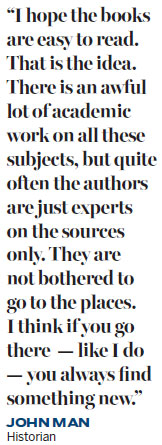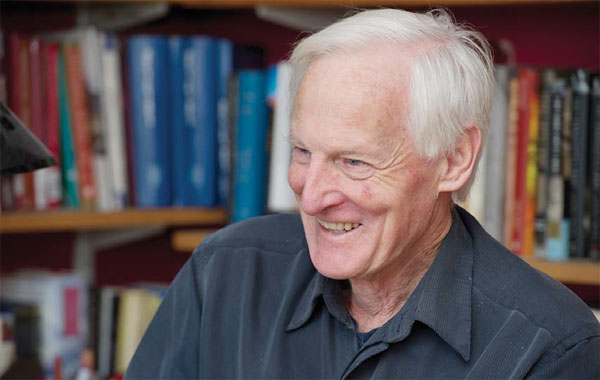Historian who makes history accessible

John Man has written several books on China, covering subjects as diverse as the Terracotta Warriors and explorer Marco Polo
John Man, a leading writer on China, is unconcerned about being described as a popular historian.
His books, which include biographies of Marco Polo and Genghis Khan, and have a trademark light jaunty style, sell in their hundreds of thousands.
| John man, a leading writer on China. Nick J.B. Moore / For China Daily |
The latest, Saladin: The Life, The Legend and the Islamic Empire, to be published in paperback in April, examines the life of the great 12th century Arab leader who fought off crusaders from Europe.
"I hope the books are easy to read. That is the idea. There is an awful lot of academic work on all these subjects, but quite often the authors are just experts on the sources only. They are not bothered to go to the places. I think if you go there - like I do - you always find something new."

Man, 74, who was speaking in his book-lined study in north London, hopes he will generate fresh interest in Saladin, still an iconic figure in the Middle East but relatively unknown elsewhere.
"He was a great Kurdish Arabic general during the crusades, and his major claim to fame was that he kicked the Europeans out of Jerusalem and is therefore a hero in the Arab world.
"Just at the moment he is relevant and crucial because he united Shia and Sunni - not in the best possible way because he was pretty rough on the Egyptian Shia - but at least he united them."
The author points out Saladin remains an important figure to current leaders such as Bashar al-Assad, the president of Syria.
"This is largely because Damascus was Saladin's base, and that is where his grave is and also a major statue of him. The Assads look back to Saladin and, of course, as everyone is hoping and looking for the next leader who can unite Sunni and Shia."
Saladin lived at a time when the Silk Road provided major trade links between the Islamic world and China.
"This was a time when Islam and the Chinese were probably the leading civilizations in the world. Islam at the time was very outgoing and tolerant."
Man read modern languages at Keble College, Oxford, and after completing his studies was attracted to a notice on the college notice board asking for people to join an expedition to Mongolia.
"I had been a student teacher in Vienna, and I was intrigued at what lay beyond the Iron Curtain and this was about the furthest point then in the Soviet empire. I asked whether if I learned the language I could come and they said I could."
He then set about doing a degree in Mongolian at the School of Oriental and African Studies in London.
The trip never went ahead, but the decision to study the language gave him a rare specialization, which was to prove vital for his later career.
In the meantime, he became a journalist with Reuters in Bonn in the late 1960s.
He moved into publishing before becoming a full time author in 1983. He has produced 18 books (14 of which are still in print), including several on China, covering subjects as diverse as the Terracotta Warriors, the Great Wall and Polo. His biography of Genghis Khan has sold 200,000 copies alone and has been translated into 21 languages.
The Mongol leader has had something of a historical makeover, with a more nuanced image emerging than that of just a brutal military leader. Man was an adviser on Sergei Bodrov's 2007 Oscar-nominated film Mongol.
"For his victims, the older image was certainly a reality. He was responsible for many millions of deaths, but he was at the same time a brilliant leader."
He insists Khan didn't also habitually boil people as a form of capital punishment, as is the popular legend.
"There was a traditional form of death in Mongolia, which involved apparently boiling people. It was a barbaric practice. He didn't do it. I think it was done to his people and he took revenge."
Man coincidentally lives barely a mile from Frances Wood, the retired curator of the Chinese collection at the British Library, who wrote a book claiming the Italian explorer Marco Polo never went to China, evidenced by him not mentioning chopsticks among other things. This is not a view that Man shared in his 2009 book Xanadu: Marco Polo and Europe's Discovery of the East.
"Yes, I have had lunch with her many times," he says, laughing. "He (Polo) doesn't mention tea, either, or the Great Wall. There are one or two things he exaggerates, but he did go to China, for sure."
Man, who was awarded the rare honor of a Friendship Medal from the Mongolian government in 2007, has made many trips to Mongolia but has never fallen in love with the local food. "I love Chinese, though," he says.
He admires the Mongolian way of life, which proved remarkably resilient to the collapse of the Soviet Union in 1991.
"The great thing about Mongolia is that it has grassland. Because of the grass on which its cattle can graze, there was a floor through which it could not fall. This was not the case of Eastern Europe, which suffered industrial collapse. In Mongolia, everyone had friends and family in the countryside."

Man believes his latest book, as well as his work on Mongolia and China, will renew interest in the Silk Road trading corridor. One of the Chinese government's current core strategies is its Belt and Road Initiative.
"Between China and Islam and what we call the Silk Road and also around the coasts there was this terrific interaction at the time of Saladin."
Somewhat frustratingly, however, he has struggled to find during his research for his new book any answers to the various current Middle East crises.
"I don't think anybody has a clue what a modern-day Saladin could do."
Zeng Wangmai contributed to the story.
andrewmoody@chinadaily.com.cn
(China Daily European Weekly 02/26/2016 page32)
Today's Top News
- Factory activity sees marginal improvement in November
- Venezuela slams US' 'colonial threat' on its airspace
- Xi: Strengthen cyberspace governance framework
- Takaichi must stop rubbing salt in wounds, retract Taiwan remarks
- Millions vie for civil service jobs
- Chinese landmark trade corridor handles over 5m TEUs































